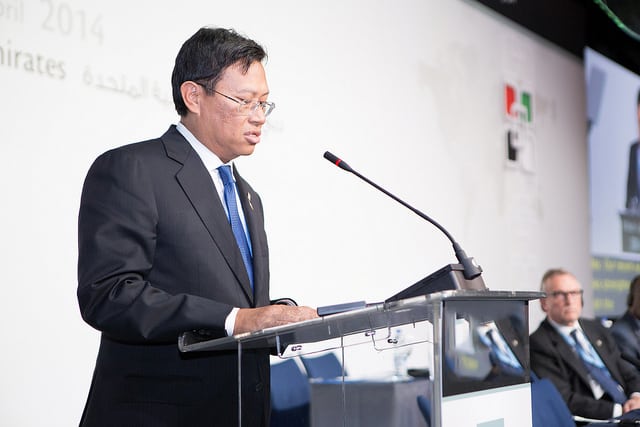[Avionics Today May 27, 2014] The concept of using an aviation computing cloud to track flight data in real time gained traction at a two-day conference in Kuala Lumpur focused on improving aircraft tracking following the disappearance of Malaysia Airlines’ Flight MH370.

Ahmad Shabery Cheek, Malaysia’s minister of communications and multimedia, called for the two day ITU summit during the World Telecommunication Development Conference in Dubai.
Organized by the International Telecommunication Union (ITU) — a United Nations (UN) agency for information and communication technologies — the two day conference was attended by avionics manufacturers, trade associations and representatives from civil aviation authorities to explore how current technology could facilitate the development of real-time tracking of commercial aircraft. ITU coordinates the shared global use of radio spectrum, and will look to use its expertise in that field to help the International Civil Aviation Organization (ICAO) introduce a new international standard for real-time tracking of aircraft.
ITU’s conference is the latest in a string of recent government-industry international gatherings in the wake of the MH370 incident. ICAO recently hosted the first meeting of the Aircraft Tracking Task Force (ATTF), a panel of aviation industry experts organized by the International Air Transport Association (IATA). ATTF plans on presenting a high level concept of operations for a global aircraft tracking service at the 2015 ICAO High Level Safety Conference (HLSC).
During the two-day meeting in Malaysia, the ITU-hosted “Expert Dialogue” focused on cloud computing technology as a leading element of the future global aircraft tracking service that ICAO is seeking.
“Thankfully, the number of aircraft which disappear are not many,” said Ahmad Cheek, Malaysia’s minister of communication and multimedia. “But having gone through the experience of MH370, even one aircraft disappearing is one too many.”
Cloud computing describes the process of storing and accessing data and programs over the Internet instead of using a computer’s hard drive. Information Technology (IT) teams at various government agencies and businesses have adopted the cloud computing model over the last decade as it essentially allows on-demand network access to a shared pool of configurable computing resources.
Creating an aviation data cloud and permitting access to it for airlines, operators and Air Navigation Service Providers (ANSPs) is a huge undertaking that will require ITU and ICAO to identify the concept of the operation and determine necessary spectrum requirements and telecommunication standards. British satellite service provider Inmarsat recently proposed a “black box in the cloud” service, where certain in-flight trigger events such as an unapproved course deviation would stream flight data recorder information off an aircraft in real-time to approved recipients.
According to ITU, participants at the meeting want ICAO and ITU to develop standards that will define requirements on the protection of flight data, information security and the appropriate use of flight data and data ownership for the use of an aviation cloud for real-time monitoring of flight data.
“ITU has a long history of harmonizing the use of the radio spectrum and developing international telecommunication/ICT standards and is offering to bring this competence to assist aviation, in partnership with ICAO, to consider alternative ways of using technology such as cloud computing and big data, to provide these solutions,” said Malcolm Johnson, director of ITU’s telecommunication standardization bureau.
ITU concluded the two day conference by stating that it would continue to study current and future spectrum requirements for global aircraft flight tracking and “make appropriate allocations” at the 2015 World Radiocommunication Conference.
“This experts’ dialogue provided an opportunity to establish clear actions going forward, in particular related to ITU’s expertise in the fields of radio-frequency spectrum, satellites and ICT standardization,” said Johnson. “It will help instigate an international effort to ensure that an event like MH370 is not repeated.”